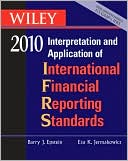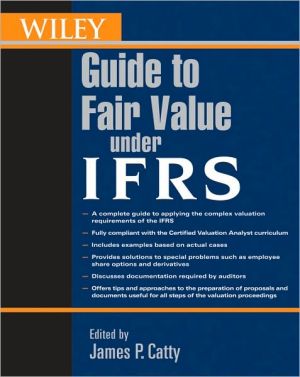Corporate Governance and Accountability
Corporate governance is concerned with how a company is directed and controlled and, in particular, with the role of the directorate and the need to ensure that there is an effective framework for accountability of directors to owners.\ Corporate Governance and Accountability, Third Edition provides readers with an up-to-date summary of the most recent developments in corporate governance. The book provides a full discussion of corporate governance issues and adopts a holistic...
Search in google:
Recent examples of massive corporate failures, such as Enron, have highlighted the need to reform corporate governance at an international level. The importance of effective corporate governance for corporate success, as well as for social welfare, cannot be overstated. Corporate Governance and Accountability has been written to provide readers with an up-to-date summary of both theory and practice in the area. Features:Provides a full discussion of corporate governance issues taking the broadest view of the corporate governance agenda.Draws on the extensive and original research carried out by the authors and demonstrates the close relationship between academic research and professional practice.Contains numerous contemporary illustrations and case studies, including a chapter dedicated to the collapse of Enron.Focuses on the relevance of corporate governance reform throughout the world.Highlights the importance of corporate social responsibility to companies and institutional investors from a corporate governance perspective.Includes an appendix containing the Combined Code on Corporate Governance issued by the Financial Reporting Council in July 2003. Corporate Governance and Accountability has been written as a core textbook for students taking undergraduate and MBA courses in corporate governance and corporate social responsibility. A website containing answers to end of chapter questions for lecturers can be found at www.wileyeurope.com/go/solomon
Corporate Governance and Accountability\ \ By Jill Solomon Aris Solomon \ John Wiley & Sons\ ISBN: 0-470-84365-9 \ \ \ Chapter One\ Defining corporate governance\ Aims and objectives\ This chapter provides an introduction to the corporate governance discipline, predominantly from a UK perspective. The specific objectives of this chapter are to:\ * discuss a range of definitions of corporate governance in order to arrive at a definition that is appropriate for this text;\ * appreciate the development of corporate governance from a historical perspective;\ * compare and contrast several theoretical frameworks that are applied to the corporate governance discipline.\ Introduction\ 'Corporate governance' has become one of the most commonly used phrases in the current global business vocabulary. This raises the question, 'is corporate governance a vital component of successful business or is it simply another fad that will fade away over time?' The notorious collapse of Enron in 2001, one of America's largest companies, has focused international attention on company failures and the role that strong corporate governance needs to play to prevent them. The UK has responded by producing the Higgs Report (2003) and the Smith Report (2003), whereas the US produced the Sarbanes-Oxley Act (2002). Nations around the world are instigating far-reaching programmes for corporate governance reform, as evidenced by the proliferation of corporate governance codes and policy documents,voluntary or mandatory, both at the national and supra-national level. We believe that the present focus on corporate governance will be maintained into the future and that, over time, corporate governance issues will grow in importance, rather than fade into insignificance. The phenomenal growth of interest in corporate governance has been accompanied by a growing body of academic research. As the discipline matures, far greater definition and clarity are being achieved concerning the nature of corporate governance. In this chapter we consider the broad-ranging nature of corporate governance and the many ways of defining the subject. We discuss corporate governance from a theoretical perspective, setting the scene for the following chapters.\ What is corporate governance?\ There is no single, accepted definition of corporate governance. There are substantial differences in definition according to which country we are considering. The main focus of this chapter and the following five is the agenda for corporate governance reform, mainly from a UK perspective. However, we use the US case of Enron in Chapter 2 to demonstrate the need to improve corporate governance mechanisms. However, even within the confines of one country's system, such as the UK, arriving at 'a' definition of corporate governance is no easy task. Corporate governance as a discipline in its own right is relatively new. We consider that the subject may be treated in a narrow or a broad manner, depending on the viewpoint of the policy maker, practitioner, researcher or theorist. It seems that existing definitions of corporate governance fall on to a spectrum, with 'narrow' views at one end and more inclusive, 'broad' views placed at the other. One approach toward corporate governance adopts a narrow view, where corporate governance is restricted to the relationship between a company and its shareholders. This is the traditional finance paradigm, expressed in 'agency theory'. At the other end of the spectrum, corporate governance may be seen as a web of relationships, not only between a company and its owners (shareholders) but also between a company and a broad range of other 'stakeholders': employees, customers, suppliers, bondholders, to name but a few. Such a view tends to be expressed in 'stakeholder theory'. This is a more inclusive and broad way of treating the subject of corporate governance and one which is gradually attracting greater attention, as issues of accountability and corporate social responsibility are brought to the forefront of policy and practice in the UK and elsewhere.\ In Table 1.1 we consider some published definitions of corporate governance, each of which adopt a different view of the subject and provide a consensus on the relative importance of these definitions. The consensus derives from a questionnaire survey that sampled a large number of UK institutional investors (Solomon et al., 2000b). In the questionnaire survey we evaluated institutional investors' views of corporate governance. We presented them with a number of established definitions of corporate governance. These definitions were not intended to discriminate completely between different views, but rather each was chosen to emphasize slightly different interpretations of the corporate governance function. The selection represents a range of definitions, starting from the narrowest which described the basic role of corporate governance (The Cadbury Report, 1992; see also, Cadbury, 2002), to a solely financial perspective involving only shareholders and company management (Parkinson, 1994) and extending to a broader definition that encompassed corporate accountability to a wide range of stakeholders and society at large (Tricker, 1984). We also included a definition that emphasized the importance of shareholder activism, as this allowed us to gauge institutional investors' views on their own role in corporate governance (The Corporate Governance Handbook, 1996). The selection also included definitions that were regulation-centred (Cannon, 1994) or focused on corporate success (Keasey and Wright, 1993). The definitions in Table 1.1 are ranked according to the institutional investors' views of their relative importance. The table illustrates that the finance paradigm is probably the most easily acceptable to UK institutional investors, as Parkinson's (1994) shareholder-oriented definition received strongest support. This is not surprising as they are major shareholders and are likely to give themselves priority in terms of corporate governance relationships.\ In general the definitions of corporate governance found in the literature tend to share certain characteristics, one of which is the notion of accountability. Narrow definitions are oriented around corporate accountability to shareholders. Some narrower, shareholder-oriented definitions of corporate governance focus specifically on the ability of a country's legal system to protect minority shareholder rights (e.g., La Porta et al., 1998). However, such definitions are mainly applicable to cross-country comparisons of corporate governance, and at present we are focusing on corporate governance within the UK. We return to the legal influence on different systems of corporate governance around the world in Chapters 7 and 8.\ Broader definitions of corporate governance stress a broader level of accountability to shareholders and other stakeholders. We can see that Tricker's (1984) definition, encompassing accountability to a broader group of people than just the shareholders, was also supported strongly by institutional investors from the results in Table 1.1. This demonstrates an interest within the financial community in a broader, stakeholder-oriented approach to corporate governance. The broadest definitions consider that companies are accountable to the whole of society, future generations and the natural world. We have agreed on our own, relatively broad, definition of corporate governance for the purposes of this book, based on our research and our views concerning corporate governance issues. We suggest that corporate governance is the system of checks and balances, both internal and external to companies, which ensures that companies discharge their accountability to all their stakeholders and act in a socially responsible way in all areas of their business activity.\ Throughout this book we attempt to show that theoretical frameworks that suggest companies should be accountable only to their shareholders are not necessarily inconsistent with theoretical frameworks that champion stakeholder accountability. The reason underlying this argument is that shareholders' interests can only be satisfied by taking account of stakeholder interests, as companies that are accountable to all of their stakeholders are over the long term more successful and more prosperous. Our definition of corporate governance therefore rests on the perception that companies can maximize value creation over the long term, by discharging their accountability to all of their stakeholders and by optimizing their system of corporate governance. This view is supported by the emerging literature. We discuss some of this literature in Chapters 9 and 10, specifically. Indeed, our own empirical research has provided substantial support for the view that corporate financial performance is positively related to corporate governance. We have found substantial evidence to suggest a growing perception among institutional investors in the City of London that there is a corporate governance dividend as well as a dividend attached to stakeholder accountability. Indeed, we have found from our research that one reason 'good' corporate governance, as well as corporate social responsibility, are linked significantly to good corporate financial performance is its link with management quality. Better managers instigate better corporate governance and pay attention to their stakeholders. Better managers also manage companies more effectively and produce higher financial returns. This view as expressed by an investment analyst in a large UK investment institution, in response to a questionnaire, who commented that:\ I feel that organisations that demonstrate a commitment to a broad range of stakeholders are likely to show better management skills than those that do not ...\ The Higgs Report (1993) reflected a similar sentiment, emphasizing a strong link between good corporate governance, accountability and value creation, in the following:\ ... the UK framework of corporate governance ... can clearly be improved ... progressive strengthening of the existing architecture is strongly desirable, both to increase corporate accountability and to maximise sustainable wealth creation. (Higgs Report, p. 12, para. 1.13)\ Overall, this perception is growing among the professional community and academic research is beginning to provide empirical evidence in support of this view of corporate governance, accountability and corporate profitability. However, this is the 'business case' for corporate governance and, more generally, for corporate social responsibility. Should companies improve corporate governance and discharge accountability to all of their stakeholders purely because it is ethical? We discuss these ethical issues in the subsection on stakeholder theory on p. 23. In the real world, it is unlikely that businessmen and investors will be interested in acting ethically unless there are positive financial returns to be made from so doing. As there appears to be a strong business case underlying corporate governance reform and stakeholder accountability, then the corporate and financial communities are more likely to embrace these approaches. Having provided an introduction to corporate governance and a sample of the many approaches to defining the subject, we now move on to discussing a number of theoretical frameworks that are used to analyse corporate governance issues.\ Theoretical frameworks\ A number of different theoretical frameworks have evolved to explain and analyse corporate governance. Each of these frameworks approaches corporate governance in a slightly different way, using different terminology, and views corporate governance from a different perspective, arising from a different discipline (e.g., the agency theory paradigm arises from the fields of finance and economics, whereas transaction cost theory arises from economics and organizational theory). Other frameworks, such as stakeholder theory, arise from a more social-orientated perspective on corporate governance. Although there are marked differences between the various theoretical frameworks, as they each attempt to analyse the same problems but from different perspectives, they do share significant commonalities. Further, the frameworks overlap theoretically. In this section we intend to outline some of the most commonly used theoretical frameworks in accounting and finance-related disciplines and to specify some of the commonalities and differences between these competing paradigms. We examine agency theory, transaction cost theory and stakeholder theory. Other approaches include organization theory and stewardship theory (see Tricker, 1998). It is also important to recognize that there are cultural and legal influences on corporate governance, which we consider in Part II, where relevant.\ To appreciate fully the various theories of corporate governance, it is useful to review briefly the development of stock markets, as their structure and operations have led to the development of agency theory. In the introductory chapter, we summarized the historical development of corporate governance in the UK. For the purposes of this chapter, we revisit the development of limited liability with the aim of laying the foundations of agency theory. Before stock markets developed, companies relied on finance from wealthy individuals, usually relatives of the entrepreneur. Companies were owned and run by the same people. For economies to grow, it was necessary to find a large number of different investors to provide money for companies, so that they could expand. The principal element of today's stock markets, which has encouraged investors to buy shares, thereby ensuring a steady flow of external finance for companies, is known as limited liability. This was developed in 1855 and means that shareholders are not responsible for the debts of the companies in which they invest. The development of limited liability meant that investors were more prepared to buy shares, as all they would risk was their investment-not their entire wealth. A stock market is a means by which a company can raise capital by selling shares to investors, who become shareholders. Not only can investors buy shares but also these financial securities may be traded on the stock market. It is important to remember that the only time the company receives any funds is when the shares are sold for the first time. The important issue from a theoretical viewpoint is that in buying a share, even though an investor does not jeopardize his entire wealth, he is becoming an 'owner' of the company. However, although the majority of shareholders own, in part, the investee company, they have little to do with running the company, as this is the job of the company directors, to whom they entrust their funds.\ (Continues...)\ \ \ \ \ Excerpted from Corporate Governance and Accountability by Jill Solomon Aris Solomon Excerpted by permission.\ All rights reserved. No part of this excerpt may be reproduced or reprinted without permission in writing from the publisher.\ Excerpts are provided by Dial-A-Book Inc. solely for the personal use of visitors to this web site. \ \
PrefaceAcknowledgementsIntroduction1Pt. ICorporate governance: frameworks and mechanisms91Defining corporate governance112Enron: a case study in corporate governance failure313Corporate governance reform in the UK454The role of boards in corporate governance655The role of institutional investors in corporate governance896The role of transparency in corporate governance119Pt. IIGlobal corporate governance1457An introduction to corporate governance systems worldwide1478A reference dictionary of corporate governance systems161Pt. IIIBroadening the corporate governance agenda1859Discharging a broader corporate accountability18710Socially responsible investment21311The future of corporate governance and accountability243AppThe Combined Code on Corporate Governance (July 2003)249References271Index289








